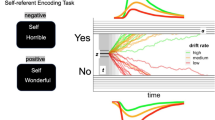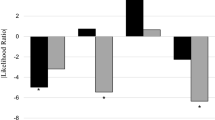Abstract
Previous research examining information processing in subclinical depression has typically not sought to differentiate between depressive information processing structures. To examine this issue, an incidental recall paradigm was used to assess whether subclinically depressed individuals have self-schemas that facilitate the diffuse processing of any depressive information, or whether such structures are specific to state-relevant versus trait-relevant depressive information. In addition to the automatic information processing that is usually assessed in depression, effortful information processing was examined to determine if depressive cognitive dysfunctions were limited to automatic processing mechanisms. Results for subclinically depressed subjects showed a sensitivity to state depressive information processed automatically, and to trait depressive information processed effortfully. These data are consistent with the presence of a relatively specific, state self-referent depressive schema in subclinical depression, and suggest that, when presented with unfavorable information, subclinically depressed individuals will focus more attention on information that is qualitatively more negative.
Similar content being viewed by others
References
Bargh, J. A., & Tota, M. E. (1988). Context-dependent automatic processing in depression: Accessibility of negative constructs with regard to self but not others.Journal of Personality and Social Psychology, 54, 925–939.
Beck, A. T. (1967).Cognitive therapy and the emotional disorders. New York: International Universities Press.
Beck, A. T. (1976).Cognitive therapy and the emotional disorders. New York: International Universities Press.
Beck, A. T. (1987). Cognitive models of depression.Journal of Cognitive Psychotherapy: An International Quarterly, 1, 5–37.
Beck, A. T., Rush, A. J., Shaw, B. F., & Emery, G. (1979).Cognitive therapy of depression. New York: Guilford Press.
Beck, A. T., Steer, R. A., & Garbin, M. G. (1988). Psychometric properties of the Beck Depression Inventory: Twenty-five years of evaluation.Clinical Psychology Review, 8, 77–100.
Chaplin, W. F., John, O. P., & Goldberg, L. R. (1988). Conceptions of states and traits: Dimensional attributes with ideas as prototypes.Journal of Personality and Social Psychology, 54, 541–557.
Clark, D. A. (1986). Cognitive-affective interaction: A test of the “specificity” and the “generality” hypotheses.Cognitive Therapy and Research, 10, 607–624.
Clark, D. A., Beck, A. T., & Brown, G. (1989). Cognitive mediation in general psychiatric outpatients: A test of the content-specificity hypothesis.Journal of Personality and Social Psychology, 56, 958–964.
Conway, M., & Howell, A. (1990). Ego involvement leads to positive self-schema activation and to a positivity bias in information processing.Motivation and Emotion, 13, 1989.
Craik, F. I. M., & Tulving, E. (1975). Depth of processing and the retention of words in episodic memory.Journal of Experimental Psychology, 104, 268–294.
Dempsey, P. (1964). A unidimensional depression scale for the MMPI.Journal of Consulting Psychology, 28, 364–370.
Derry, P. A., & Kuiper, N. A. (1981). Schematic processing and self-reference in clinical depression.Journal of Abnormal Psychology, 90, 286–297.
Dobson, K. S., & Shaw, B. F. (1987). Specificity and stability of self-referent encoding in clinical depression.Journal of Abnormal Psychology, 96, 34–40.
Francis, W. N., & Kucera, H. (1982).Frequency analysis of English Usage: Lexicon and grammar. Boston: Houghton Mifflin.
Greenberg, M. S., & Beck, A. T. (1989). Depression versus anxiety: A test of the content specificity hypothesis.Journal of Abnormal Psychology, 98, 9–13.
Haaga, D., Dyck, M. J., & Ernst, D. (1991). Empirical status of cognitive theory of depression.Psychological Bulletin, 110, 215–236.
Ingram, R. E. (1984). Toward an information processing analysis of depression.Cognitive Therapy and Research, 8, 443–478.
Ingram, R. E. (1989). Affective confounds in social-cognitive research.Journal of Personality and Social Psychology, 57, 715–722.
Ingram, R. E. (1990). Self-focused attention in clinical disorders: Review and a conceptual model.Psychological Bulletin, 107, 156–176.
Ingram, R. E., Fidaleo, R. A., Friedberg, R., Shenk, J. L., & Bernet, C. Z. (1993).Content and mode of information processing in major depressive disorder. Manuscript submitted for publication.
Ingram, R. E., Kendall, P. C., Smith, T. W., Donnell, C., & Ronan, K. (1987). Cognitive specificity in emotional distress.Journal of Personality and Social Psychology, 53, 734–742.
Ingram, R. E., & Reed, M. J. (1986). Information encoding in depression: Findings, issues, and future directions. In R. E. Ingram (Ed.),Information processing approaches to clinical Psychology. Orlando: Academic Press.
Ingram, R. E., Smith, T. W., & Brehm, S. S. (1983). Depression and information processing: Self-schemata and the encoding of self-referent information.Journal of Personality and Social Psychology, 45, 412–420.
Kendall, P. C., Hollon, S. D., Beck, A. T., Hammen, C. L., & Ingram, R. E. (1987). Issues and recommendations regarding the use of the Beck Depression Inventory.Cognitive Therapy and Research, 11, 289–299.
Klein, S. B., & Kihlstrom, J. F. (1986). Elaboration, organization, and the self-reference effect in memory.Journal of Experimental Psychology: General, 115, 26–38.
Kuiper, N. A., & Derry, P. A. (1982). Depressed and nondepressed content self-reference in mild depressives.Journal of Personality, 50, 67–80.
Mueller, J. H., Thompson, W. B., & Davenport, J. S. (1986). Trait information: Person schemata or semantic tags?Bulletin of the Psychonomic Society, 24, 179–182.
Posner, M. I. (1978).Chronometric explorations of mind. Hillsdale, NJ: Erlbaum.
Shiffrin, R. M., & Schneider, W. (1977). Controlled and automatic human information processing: II. Perceptual learning, automatic attending and a general theory.Psychological Review, 84, 127–190.
Teasdale, J. D. (1983). Negative thinking in depression: Cause, effect, or reciprocal relationship?Advances in Behavior Research and Therapy, 5, 3–25.
Teasdale, J. D. (1988). Cognitive vulnerability to persistent depression.Cognition and Emotion, 2, 247–274.
Wenzlaff, R. M., Wegner, D. M., & Roper, D. W. (1988). Depression and mental control: The resurgence of unwanted negative thoughts.Journal of Personality and Social Psychology, 55, 882–892.
Author information
Authors and Affiliations
Rights and permissions
About this article
Cite this article
Ingram, R.E., Partridge, S., Scott, W. et al. Schema specificity in subclinical syndrome depression: Distinctions between automatically versus effortfully encoded state and trait depressive information. Cogn Ther Res 18, 195–209 (1994). https://doi.org/10.1007/BF02357775
Issue Date:
DOI: https://doi.org/10.1007/BF02357775




